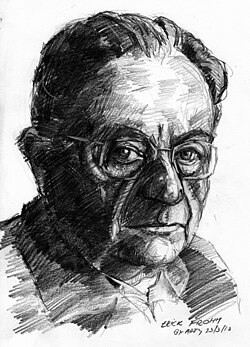Erich Fromm
| Erich Fromm | |
|---|---|

Fromm in 1970
|
|
| Born |
Erich Seligmann Fromm March 23, 1900 Frankfurt am Main, Germany |
| Died | March 18, 1980 (aged 79) Muralto, Ticino, Switzerland |
| Era | 20th century |
| Region | Western philosophy |
| School | Frankfurt School, critical theory, humanistic psychoanalysis, Humanistic Judaism |
|
Main interests
|
Humanism, Social theory, Marxism |
|
Notable ideas
|
Being and Having Modes of Existence, Security versus Freedom, Social character, Character orientation |
|
Influences
|
|
Erich Seligmann Fromm (German: [fʀɔm]; March 23, 1900 – March 18, 1980) was a German social psychologist, psychoanalyst, sociologist, humanistic philosopher, and democratic socialist. He was associated with the Frankfurt School of critical theory.
Erich Fromm was born on March 23, 1900, at Frankfurt am Main, the only child of Orthodox Jewish parents. He started his academic studies in 1918 at the University of Frankfurt am Main with two semesters of jurisprudence. During the summer semester of 1919, Fromm studied at the University of Heidelberg, where he began studying sociology under Alfred Weber (brother of the better known sociologist Max Weber), psychiatrist-philosopher Karl Jaspers, and Heinrich Rickert. Fromm received his PhD in sociology from Heidelberg in 1922. During the mid-1920s, he trained to become a psychoanalyst through Frieda Reichmann's psychoanalytic sanatorium in Heidelberg. He began his own clinical practice in 1927. In 1930 he joined the Frankfurt Institute for Social Research and completed his psychoanalytical training.
...
Wikipedia
